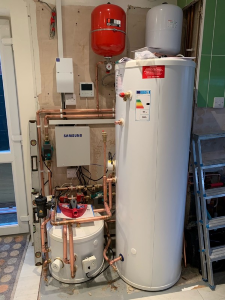The rise of the residential heat pump

With the news that no new gas boilers will be sold from 2035, it’s time to look at alternative ways to heat our homes.
After the Government announced they would be offering £5000 to households in England and Wales to replace gas boilers with heat pumps, interest in this alternative heating method has peaked.
So, what are heat pumps and how do they work?
A heat pump is an electrically powered device that absorbs heat from the air, ground or water around a building, passes it through a refrigerant which increases the temperature and then pumps it through to radiators and the hot water cylinder.
Cath Jadhav, a Warwickshire resident, explains why she chose to install a heat pump and the changes she’s seeing after just a couple of weeks:
“We’ve been making changes for some time to our lifestyle to minimise our impact on the planet, in fact my family will say I’m an obsessive recycler. We try to avoid sending anything to landfill, for example we have a new cooker coming, but we found a home for our old one rather than throwing it away.
“We’d reached the point where there was not a lot else we could do with our house – the loft is insulated and the cavities are filled.
“Our boiler was about 12 years old and installing a heat pump as a replacement ticked a lot of boxes. The £5000 Government subsidy also made it an affordable option. I’ve been working from home and sat wearing layers because I didn’t want to turn the heating on because it was too expensive.
“It’s only been a short while but we’re already seeing a huge difference. Instead of blasting the heat in the morning or evening to warm the house up the heat pump keeps the house constantly warm without the need for that blast.
“I’m a definite advocate of heat pumps, I’ve been telling people at work how wonderful it is We’re used to a combi boiler where we can make as much hot water as we like, we now have a hot water tank in the kitchen and even with all of us we’ve not had an issue with hot water. The heat pump still needs some fine tuning but overall, it works well. It's set at 19 degrees and is unlike heating where you get in and have to turn it on and feel it warm up; it’s constant. It’s brilliant.
“Our hope is that the running costs will be similar to running the boiler for a couple of hours in the morning and the evening. We have solar panels on the roof, so the plan is they will power the heat pump when it’s running during the day. At the end of the day we’re expecting similar costs, but a more comfortable house for everyone in it during the day.”
According to The Renewable Energy Hub there are many advantages of a heat pump including:
- Heat pumps are much safer than systems that are based on combustion;
- They are cheaper to run than oil and gas boilers;
- The system reduces your carbon emissions, and it has an efficient conversion rate of energy to heat;
- Less maintenance than combustion heating systems;
- Can provide cooling during the summer, effectively making it an air conditioner;
- They have a very long lifespan of up to 50 years. As a result, they are extremely reliable and a steady source of heat; and
- You may be eligible for payment under the Renewable Heat Incentive (RHI) scheme.
